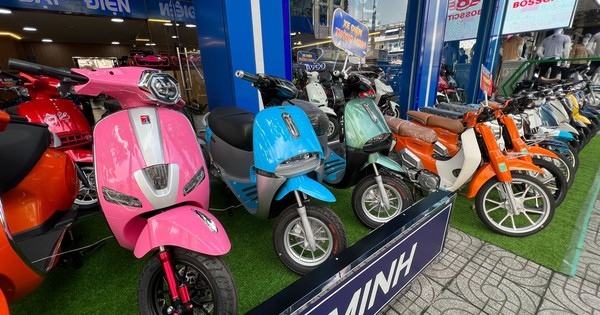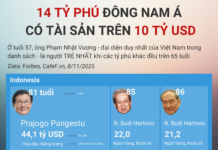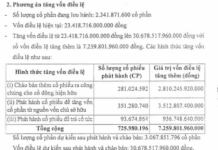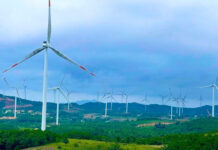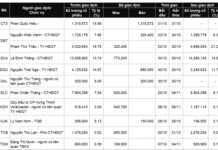The Vietnamese electric motorbike market is highly promising, and numerous manufacturers and assemblers have made significant investments, offering a wide range of motorbike models that cater to diverse customer segments at various price points. However, as of late 2023, the entire country has only registered slightly over 2 million electric motorbikes, a comparatively low figure when contrasted with the approximate 72 million petrol-powered motorbikes.
Production Capacity is Plentiful
The domestic electric motorbike market is characterized by competition from dozens of motorbike brands, including many international ones.
Mr. Hoang Manh Tan, Deputy General Director of Son Ha Group, stated that the group’s electric motorbike production division is currently operating at approximately 20% capacity. Nevertheless, the group continues to plan further investments of 300 billion VND to expand its plant, aiming to increase its production capacity up to 300,000 motorbikes annually.
Meanwhile, electric motorbike manufacturer Dat Bike has established a new plant in Ho Chi Minh City, boasting double the capacity of its initial plant in Binh Duong province. According to Mr. Nguyen Ba Canh Son, founder and CEO of Dat Bike, Vietnam’s electric two-wheeler market is the largest in Southeast Asia, experiencing an impressive annual growth rate of 30%. “80% of electric motorbikes produced in Southeast Asia are intended for the Vietnamese market. Therefore, with substantial investment, the Vietnamese electric motorbike market can advance and attain a position comparable to that of developed nations in this sector, such as India and China,” Mr. Son asserted.
Mr. Nguyen Huu Phuoc Nguyen, CEO of electric motorbike manufacturer Selex Motors, acknowledged that if the market continues to expand significantly, the company will seek additional funding to establish another manufacturing plant to swiftly meet growing demand.
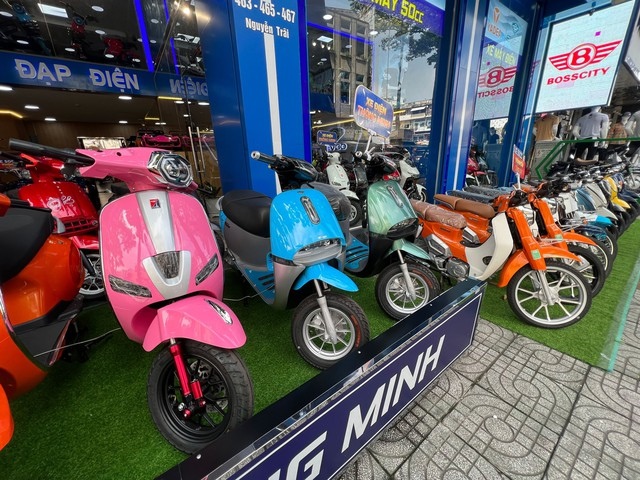
Electric motorbikes are available in the market with a wide range of models and prices, satisfying the needs of various customer segments. |
Supportive Policies Needed for Transition
In an attempt to explain why the electric motorbike market has not reached its anticipated growth, several manufacturers and assemblers have pointed out that petrol-powered motorbikes remain the dominant mode of transportation among the populace. Not many individuals readily transition from their current vehicles to newer ones without substantial government support since the current price of electric motorbikes, while decreasing, remains relatively high compared to petrol-powered motorbikes. “Many nations within the region have already implemented policies that facilitate the shift to electric motorbikes. It is imperative that we adopt similar policies,” said Mr. Hoang Manh Tan.
Mr. Nguyen Huu Phuoc Nguyen emphasized the necessity of supportive policies for transitioning to a novel product like electric motorbikes. Mr. Nguyen cited the examples of Indonesia and Thailand, which have implemented policies that provide subsidies of 400-500 USD for each electric motorbike sold. Additionally, these nations have provided tax and fee incentives to encourage citizens to purchase electric motorbikes, gradually fostering a preference for this new mode of transportation that aligns with global trends.
Governments also provide electric vehicle manufacturers and assemblers with support in the form of tax breaks, reduced land costs, and protective policies that foster business development. However, in Vietnam, import duties on components used in the production of electric vehicles remain high, ranging from 20% to 30%. In light of this, Mr. Nguyen has proposed the elimination or reduction of import duties on components for electric motorbike manufacturing to help lower the cost of these products.
“The current paradox is that while automobiles that contribute to traffic congestion receive preferential treatment in terms of registration fees for fully electric models, electric motorbikes, which are also environmentally friendly, do not yet receive such support. If tax and fee incentives were granted, the cost of electric motorbikes could decrease by 20-30%,” Mr. Nguyen calculated.
According to industry players, well-defined policies and roadmaps are necessary to instill confidence and serve as a foundation for mobilizing investment resources. For instance, specific targets should be set for the number of electric motorbikes to be consumed within a given timeframe, with the aim of transitioning ride-hailing and goods delivery services to exclusively use electric motorbikes. Furthermore, it is essential to reevaluate credit policies because individuals can currently only obtain bank loans to purchase petrol-powered motorbikes, not electric ones.
Article and photos: NGUYỄN HẢI
